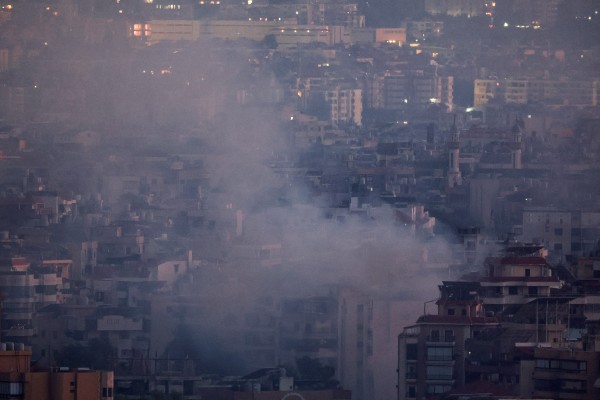Israel attacked more targets in Lebanon Sunday, where its intensifying bombardment over two weeks has killed a string of top Hezbollah leaders and driven hundreds of thousands of people from their homes.
“It has lost its head, and we need to keep hitting Hezbollah hard,” Israel’s military chief of staff Herzi Halevi said.
Lebanon’s Health Ministry said Israeli strikes on Sunday had killed 32 people in Ain Deleb in the south and 21 people in Baalbek-Hermel in the east.
Israeli drones hovered over Beirut overnight and for much of Sunday, with the loud blasts of new airstrikes echoing around the Lebanese capital.
Israel rapidly ramped up its attacks on Hezbollah two weeks ago with the declared goal of making northern areas safe for residents to return to their homes, killing much of the group’s leadership. Israel’s defense minister is now discussing widening the offensive.
Bunker busters in action — video reportedly from the scene of the attack that eliminated Nasrallah from on the ground in Beirut, Lebanon. 😮 pic.twitter.com/v6Uh8nX45k
— Emily Schrader – אמילי שריידר امیلی شریدر (@emilykschrader) September 29, 2024
Hezbollah leader Nasrallah’s death dealt a particularly significant blow to the group which he led for 32 years, and it was followed by new Hezbollah rocket fire on Israel, while Iran said his death would be avenged.
Nasrallah’s body was recovered intact from the site of Friday’s strike, a medical source and a security source told Reuters on Sunday. Hezbollah has not yet said when his funeral will be held.
The United States has urged a diplomatic resolution to the conflict in Lebanon, but has also authorised its military to reinforce in the region in a sign of the growing unease.
US President Joe Biden, asked if an all-out war in the Middle East could be avoided, said “It has to be.” He said he will be talking to Israeli President Benjamin Netanyahu but did not elaborate.
U.S. Senator Mark Kelly, who leads a Senate Armed Services subcommittee, said the bomb that Israel used to kill Nasrallah was an American-made 2,000-lb (900-kg) guided weapon.
In Iran, which helped create Hezbollah in the early 1980s, senior figures mourned the death of a senior Revolutionary Guards member killed alongside Nasrallah, and Tehran called for a U.N. Security Council meeting on Israel’s actions.
Iranian Supreme Leader Ayatollah Ali Khamenei was moved to a secure location in Iran after Nasrallah’s killing, sources told Reuters.
Supporters of the Hezbollah and other Lebanese who hailed its role fighting Israel, which occupied south Lebanon for years, mourned him on Sunday.
Lebanon’s Health Ministry said more than 1,000 Lebanese were killed and 6,000 wounded in the past two weeks, without saying how many were civilians. The government said a million people – a fifth of the population – had fled their homes.
The U.N. World Food Programme began an emergency operation to provide food for those affected by the conflict.
On Sunday, Israel’s military said the air force had struck dozens of targets in Lebanon including launchers and weapons stores while its navy said it had intercepted eight projectiles coming from the direction of Lebanon and one from the Red Sea.
Israeli Defense Minister Yoav Gallant said: “Our message is clear – for us, no place is too far”.
(REUTERS)
















